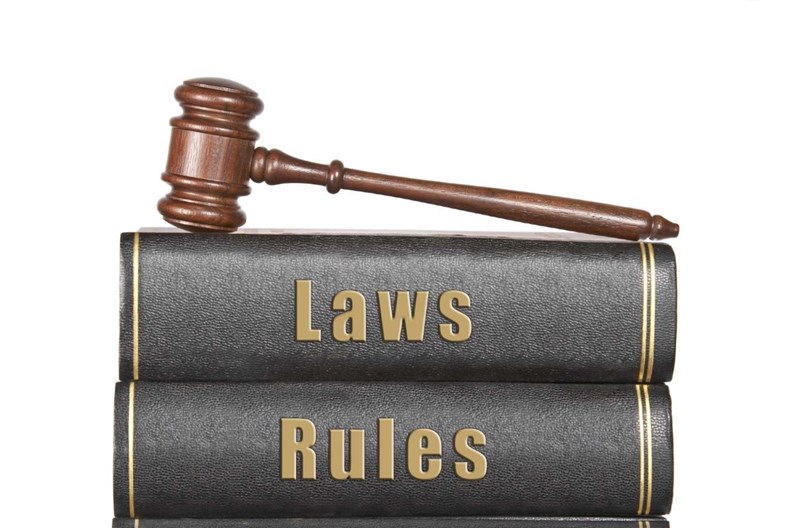Differences and disputes happen. We’re only human, and that’s why laws and rules are in place. But, the federalist system of government we use in this country is far from the most efficient system. Layers and layers of laws, statutes, and regulations fall on associations, and it's quite literally impossible to keep up. First there’s the condominium declaration and bylaws. There are the house rules, which can be separate from the bylaws. Then there are municipal codes and ordinances that can impact anything from how many trees need to be on the association’s property to plumbing to civil rights issues. On top of that, there are state laws and statutes drafted and passed by the Illinois legislature, and almost constant changes and amendments made; on top of that, there are federal laws and regulations.
Look to the Law
Associations and their counsel need to keep abreast of all of these, because they all affect how the HOA can and should conduct its everyday operations and relationships. What might seem fair on a federal level could be more complicated on a state level, and if your documents are not up to date, what might seem like a silly legal issue can easily spiral out of control. In order to avoid trouble and keep the peace, association and building boards should at least know the general lay of the land, and what kind of legal landmines are out there.
The Condo Act
Compared to other states, Illinois has a pretty clear picture when it comes to laws regarding condominiums thanks to the Illinois Condominium Property Act (ICPA), also known as the Condo Act. At its core, the Condo Act provides a blueprint for associations, and standardizes many important procedures.
Mark Rosenbaum, a principal attorney at Fischel & Kahn in Chicago describes the law this way: “The Condo Act can do one of three things. It can say the statute controls no matter what your declaration says. If it says something different, the declaration is void. If the declaration doesn’t say anything about a rule, the statute can say, ‘here’s a rule that fills in the blank.’ And it can say, ‘well if the declaration says something, the declaration rule controls over the statute.’ So you have three flavors of this—mostly it’s the first flavor—which is that the statute controls over a contrary provision of the declaration, but that isn’t always true, it’s true about 90 percent of the time. If that statute is changed, and it changes how something is done in declarations. The statute is almost always going to control, and you have to ignore what the declaration says. A good portion of Illinois’ condo act is really procedural. It isn’t substantive. It doesn’t say how many dogs you can have in a unit, and things like that. That’s left to declarations.” If you're curious about whether state law trumps association’s declarations, the simple answer is that it depends, and there's no obvious way to tell unless you memorize the Condo Act.
Even though most of the Condo Act clarifies simple procedural processes for boards and associations, it's still important to keep up to date. “There are changes in the law on condo associations. And those would be amendments from time to time to the Illinois Condominium Property Act, or the Illinois Common Interest Association Act and those deal with those specific organizations. In the past there have been major amendments to how assessments are adopted in an association. It's really important those bodies adopt. If you don't follow the right procedure, there may be a legal defect in how that budget was adopted. If you didn't collect it, then the owner has a defense that you didn't collect it properly,” says Michael Kim, attorney at Michael C. Kim & Associates in Chicago
What confuses boards more is that declarations can apparently show very clear and obvious meanings of rules, and board members might think they're interpreting basic rules correctly, when in fact they aren't.
What’s Permitted, What’s Not
“They read the section in their declarations that says, that unit owners are permitted to rent their units however subject to the control of rules promulgated by the board. And then the board thinks that gives them the right, even they're doing out of the goodness of their heart, that they can do whatever they want,” says Sima Kirsch, attorney at the Law Office of Sima L. Kirsch, PC in Chicago.
Kirsch says a good attorney familiar with condo law should be there to guide boards through the correct interpretations. “They really do need not a litigious attorney that does condominium law. Attorneys need to match their clients. Boards that want to learn, and have attorneys show them that, put that education building in the beginning, and they have somebody teach them about how to have their declarations and bylaws interact with all of the rules that control those documents,” she says.
The conflicts that arise among condo owners come in many shapes and sizes, but most of time, when you peel away at the root of the problem it can be traced to a failure to recognize the Golden Rule: treat others as you would like to be treated. In the case of U.S. law and condo associations, the rule is called the one member rule, which says that by agreeing to live in a community owners must acknowledge that there are not different statuses or classes. Everyone is to be guaranteed the same level of livability no matter their circumstances—whether they're renters, disabled, or have children.
“I’ve seen boards take actions that are discriminatory,” says Rosenbaum. “There were a lot of declarations that said you had to live in the building to be elected director. So what they were doing was creating two classes of ownership. There are owners that live in the building and they can run for the board, and there are owners that don’t live in the building and they can’t run for the board. Having that kind of distinction between owners is almost certainly invalid in that it’s creating two classes of ownership,” he says.
Discrimination can be scary word for many condo owners and board members, and many people assume discrimination cases are complicated and expensive, and that can sometimes be the case. But, if handled properly, discrimination-related conflicts can be resolved as easily as another issue.
Kim says he once handled a conflict that took place in a community with a lot of seniors before the advent of over-55 communities. “A couple moved in, had a baby. Residents came over and congratulated them on their baby, and then asked them when they were going to a move. The couple promptly went to HUD, which then promptly issued a violation charge,” he says. “The association came to us, and we talked to the investigator. We told them the board was not knowingly discriminating, they were just looking at the current documents. The family could stay, but the investigator said, 'you still have this amendment on the books, and as long as you still have it, we're going to treat this as an open matter.' When the amendment was passed it was legal. You did have seniors only communities. I told them they have to get rid of the amendment immediately in order to get rid of the charge,” and the case was resolved.
Religious Symbols
Other times, if association or board members are not willing to make small compromises, discrimination can blow up in peoples' faces. “We had a case in Illinois involving a high-rise condo that had a typical rule, which was that your outside door and frame has to be standard in appearance, cannot be changed or modified This became known as the mezuzah case,” says Kim. “This literally became a federal case. What was a rule about what you do outside your door became a religious discrimination case. The Illinois Condo Act was changed, the city of Chicago adopted ordinances that said you cannot prohibit that kind of religious object being put on a door frame. That's a case where you had a simple violation case turn into a discrimination case,” he says.
Real-life judgments like the dilemma posed in the mezuzah case can be very difficult. Small exceptions can lead to bigger ones, until rules no longer hold any weight. But, boards need to exercise smart leadership in being able to make exceptions so that they don't get rack up legal fees just because they held a somewhat insignificant rule sacred.
“Rules have to be connected to a purpose of the association. There's three purposes that a board has to take care of, the finances, the structures, and the health/welfare of the occupants. So I'm a firm believer in education,” says Kirsch. That's why boards should have a firm trust in the judgment and knowledge of their attorneys. If they don't understand something, they can't be afraid to say so, and if they think they understand something fully, they might not at all. The best attorneys, says Kirsch are ones who want to keep conflicts outside of the courtroom. Make sure you have an attorney who does not make everything a lawsuit, and keep those declarations and bylaws as up to date as possible.
Raanan Geberer is a freelance writer and a frequent contributor to the Chicagoland Cooperator.







Leave a Comment